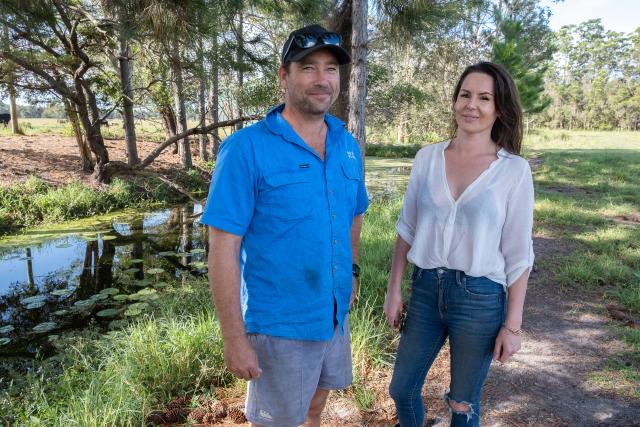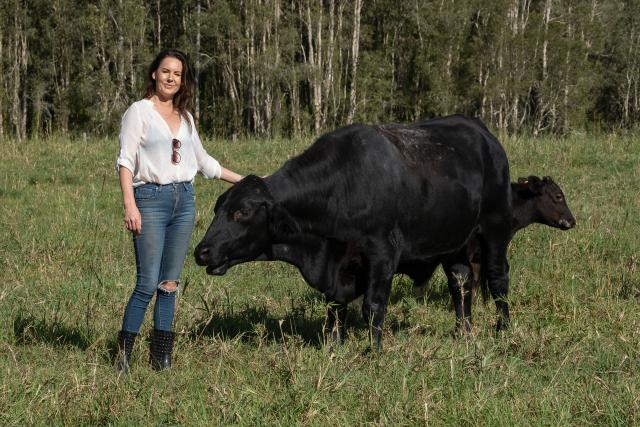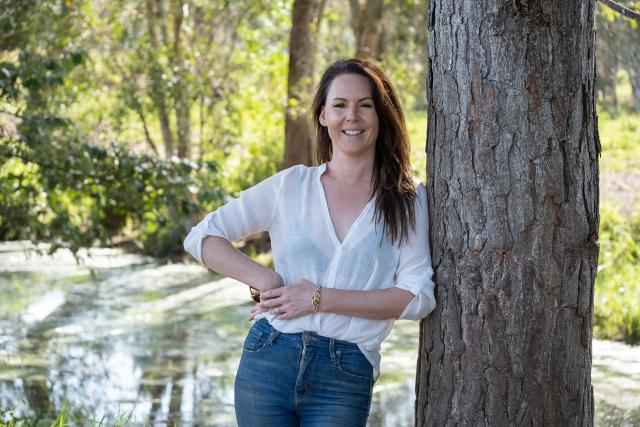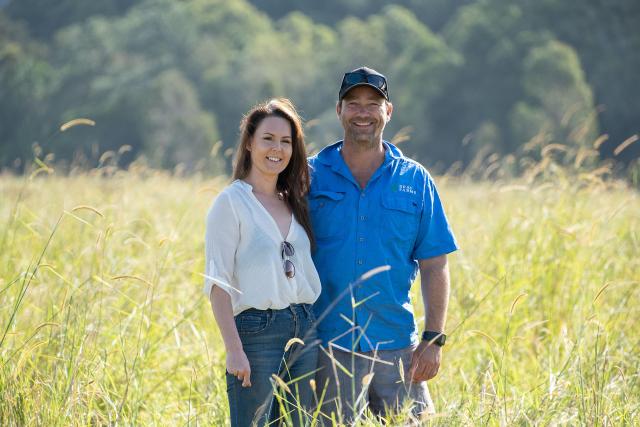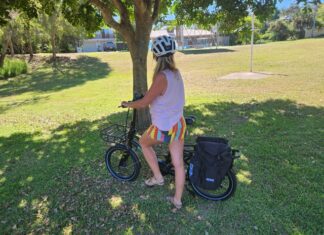They could be the poster couple for new age farming, but Bray Farms principals Nina and Mitch Bray have much loftier goals in mind.
Through their company’s properties on the Darling Downs and in Noosa Shire at Cootharaba, they want to demonstrate by personal example that agriculture, even in these trying times of drought and flood, can be profitable, rewarding and sustainable. Put simply in the mantra of Bray Farms: biodynamic, organic, regenerative.
As secretary of Country Noosa, and with both hands full as the mother of three children on school holidays, Nina was trying to magically find an extra hand to organise the Innovate To Regenerate campaign launch at The Apollonian Hotel in Boreen Point next month when Noosa Today dropped in on Easter Monday.
The family had just returned from an Easter run to check the western farming operations of the company, kids crashed out on couches after the four-hour drive, but the Brays were perfect hosts.
Speaking honestly, Nina says she’s been dropped in at the deep end to help organise the fine detail of the World Wildlife Fund-sponsored regeneration campaign, which aims to help fund and promote a wider understanding of what regenerative farming techniques can do for a community, and more broadly, for the agriculture industry.
But the mission couldn’t be in better hands. While Nina has a clear handle on spelling out the benefits of organic farming, husband Mitch has a laidback approach to explaining how it works, paddock by paddock, crop by crop.
Together, they are working to explain how farming can work as a lifestyle and a business in a frightening new era defined by climate change, food shortages and supply chain issues.
Bray Farms came together a bit over a decade ago when Nina, from a rural upbringing on the Darling Downs, and Mitch, from the same in western NSW, got together and decided to build a family and a business.
Because of their roots on the land, the initial business model for Bray Farms was totally conventional broadacre cropping, but when the kids started to arrive, things changed.
Says Nina: “Having children really changed our minds about the way we were doing things. We had a massive spray rig and Mitch would tell me to take the kids away when he was spraying on the property.
“So we got our agronomist to sit down at the kitchen table and go through it with us, how we could change. Together we put in measures to make it as risk-free as we could.
“We were building the business and couldn’t afford to have no income off the property for three years, but we worked out ways.”
The game-changer for the Brays came when, at 35, Mitch had a stroke, believed to have been brought on by Lyme Disease.
During a stop-start recovery, his immune system was severely compromised, and what had been a mere idea became an imperative.
Says Mitch: “When I got sick, that pushed us heavily in that direction, it was a big nudge.”
Nina: “That was when we bought the beach farm, which is what we call this place at Cootharaba, because it’s a lot closer than we were.
“We also saw that the climate out west was changing just as we went into the 2018-19 drought, so this was a good option for our kind of farming.”
Over this period Bray Farms sold the farms they couldn’t convert to the organic/regenerative model because they’d been compromised by having genetically-modified cropping on them, and through the farm management arm of the business, they began to see there was a lot of opposition to their vision for future farming.
Says Mitch: “We’re contract farmers as well so we contract to our neighbours and several of them had strong opinions about what we were trying to do. A typical response was, why don’t you just use fewer chemicals? They’d never want to go the whole hog.”
Nina: “People have millions of dollars tied up in their farming operations and they can’t afford to miss a beat. It’s hard enough with a long drought without adding a new element of risk.
“So we had a lot of people telling us that it simply couldn’t be done.
“Well, we’re now in our seventh year of growing grain organically out west. There is always a way to do it if you look for it.”
If you’re not a farmer, or even a gardener, the concepts of biodynamic, organic and regenerative farming are somewhat hard to grasp, but Mitch Bray has a way of breaking it down.
“I’m a big believer in having animals running over your cropping land if you’re going to go organic. All our crops grow on land that is shared with our animals, and that goes against the conventional view.
“To me, not having animals on the land is like giving your crops anorexia. You’re starving them of nutrition. We’re takers from the land, so we have to make sure we also give back.
“We’re trying to keep that balance, but give back more than we take.
“Here in Noosa we’re still trying to figure out if the land is better for what we’re doing than out west. We’re still working out the rhythms.
“What we’ve found out west is that we’re all harvesting our crops at the same time but the way we work we don’t have the same downgrades, which is to do with the fertility of our soil and the biodynamics. At least that’s my observation.”
Meanwhile, from their now semi-permanent base at Cootharaba, the Brays are working at helping to create a community of organic, regenerative farmers, while simultaneously working on putting in hemp for seed, and tending 250 head of registered full-blood Wagyu and Angus crossed with Wagyu bull. Says Mitch: “We’re trying to breed resilience in our herd because it’s not easy land for cattle.”
Nina: “Through what I’m doing with Country Noosa, I know there are so many young people who want to return to the land and work it in new ways, and I think what the Agri-Hub and Noosa Biosphere are trying to do in that area, taking the complications out of land contracts and so on, is great.
“I’m really keen to see more people here in the hinterland utilising the opportunities on the land. When we first came here we pushed the land hard, and it was happy to be worked and it responded, it flourished.”
Nina says of the Innovate to Regenerate campaign: “Well, we’re already doing it, but part of being regenerative in agriculture is to bring those same principles into the way you live your life, so I think building community is so important in that. We found that so much during Covid.
“And now we’re looking at what’s happening in the US and Canada and elsewhere where they’re suffering food shortages and supply chain disruption, which brings home the importance to us of building a local food economy in Noosa. I’ve been fortunate through Country Noosa and NBRF to meet so many people who agree.
“The screening of the film Regenerating Australia is a wonderful opportunity to bring people together to discuss this.
“Farmers are notoriously difficult to get off the farm, but hopefully inviting them to a pub will work! We’re going to get some musicians along and really make it a fun night.”
Regenerating Australia will be screened at The Apollonian Hotel, Boreen Point, on Thursday 5 May, with live music and guest speakers. Further details will be published in Noosa Today.

